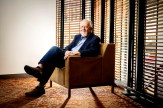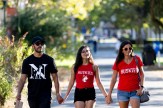The diplomacy of music
Musicians from around the world, hoping to fine-tune their talents and harmonize on a diplomatic level with American counterparts, will soon conclude a six-week stay on Northeastern’s campus that leaves them better musicians and globally minded citizens of the world.
Participants in the Fusion Arts Exchange, ages 18 to 24, came from Mali, India, Brazil, South Africa and Ireland, to live in West Village with American musicians in an intensive program mixing the study of music with a cultural exchange. The experience saw many blossom into young diplomats, says Anthony De Ritis, professor and chair of the music department. He credited faculty mentors, who include associate music professor Trevor Weston, music lecturer Robert Ward, and music department concert coordinator Arthur Rishi, and others, for making the program a success. They worked with international students and five American music students who applied for the opportunity through the State Department.
“These students brought their own personal experiences growing up in their own countries to Northeastern,” De Ritis says. “They … represented their country while mingling with U.S. students, and the U.S. students took a fresh look at themselves through an open exchange of ideas.”
The fruits of this musical interchange will unfold tonight at 7 p.m., in a free concert at the Curry Center Ballroom.
Fusion Arts Exchange, sponsored by a three-year State Department grant, brought students together through music-focused field trips and through a variety of shared musical challenges. For example, students were assigned a two-minute task to compose music reflecting the rain.
The challenge invigorated the musicians on all levels, and led to a deeper understanding of one another, DeRitis says. “The whole idea is to create a venue in which talented people from around the world will spend a lot of time together, learn about one another’s culture, and move on from the experience enriched.”
De Ritis says a lot of “bonding” occurred on long bus rides to Tanglewood, Massachusetts, New York City, and Washington, D.C., destinations that brought international visitors to culturally important sites.
Students visited the Harlem School for the Arts and attended a performance of the Lion King during a July 10 visit to New York City, and in Tanglewood, they visited the Norman Rockwell Museum, and attended performances of the Boston Symphony Orchestra.
When students return to their countries of origin, they will have gained a fresh insight into American life and culture, made possible through the university’s participation in the program, De Ritis says.
“We discussed so many things during their visit, topics ranging from music and identity to politics and culture,” he says. “In the end, the experience is about peacemaking, and opening up a greater avenue of communications through music.”





